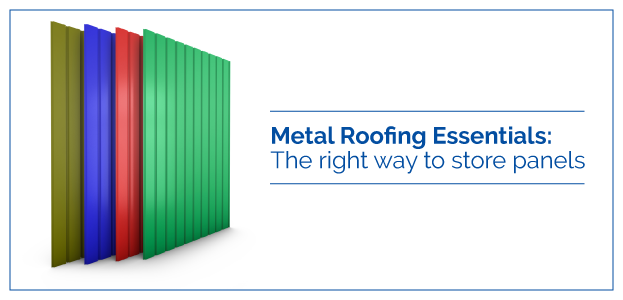
Metal Roofing Essentials: The right way to store panels
April 30th, 2019
Category: All Blogs, Maintaining your roof
You have finally decided to switch to metal roofing either for your business or residential property. Now the contractor and manufacturer of the sheets must take proper care to protect and preserve the structural integrity and aesthetics of the metal sheets. From corrosive chemicals to excessive moisture and even improper handling, several things can damage your metal roofing panels. Let’s take a look at how you can mitigate these potential issues.
The metal roofing essentials you need to take care to store panels in the right way
Material receiving checklist
When you first receive your metal panels be sure to check for immediate signs of damage during transit. Your metal roof manufacturer must ensure that all metal roofing sheets are packaged and loaded correctly, so before everything is unloaded, be sure to do a thorough check. There are three common issues that can affect your metal roofing sheets:
Moisture
Metal roofing sheets are generally moisture-proof, mainly if they are made of galvanized steel or galvalume. However, prolonged exposure to moisture during shipping can cause some damage. If you do find moisture in between your metal roofing sheets, remove them from the packaging, separate, elevate, and dry panels in an area not exposed to winds and other elements.
Denting
Denting or even bending is a common issue that occurs when metal roofing sheets or panels are shipped to their destination. If you find a dent or bend in the sheets, notify the contractor or manufacturer immediately.
Abrasion
Abrasion could be in the form of small cuts or scratches to the layer of paint on your metal roofing sheets. These abrasions are quite common during transit but you must bring immediate attention to the metal roof manufacturer.
Protection during installation
While your contractor will oversee the installation of your metal roofing system, as a property owner, you are also charged with ensuring reasonable care is taken when handling these color-coated metal sheets. These metal roofing sheets could sustain damage to the paint finish while unpacking, handling, or during installation. Although the paint system is robust and resistant to cracking, peeling, or fading, dragging one sheet over the other can mar certain glossy finishes.
Storage considerations
If there is some time between delivery and installation, store the metal roof panels to protect the integrity of the base material as well as the structure. Here are a few simple caveats to keep in mind for several common storage situations:
Prolonged storage
Prolonged storage refers to a longer duration of time between delivery and installation. If the metal sheets come in bundles, or if you live in a humid or damp environment, and immediate installation is not possible, prolonged storage will no doubt take its toll on your metal panels, mainly if there is a lot of moisture in the air.
Bundled sheets
If the sheets come in bundles, remember to store them only in a dry location. Unbend the sheets and make them stand at an angle that doesn’t completely expose them to wind. If it isn’t possible to store them in an upright position, lay them down next to each other with one end resting on the sheet next to it.
Stacked sheets
Stack the metal sheets to easily move them during packing, shipping, and storage. But make it certain, they get adequate air circulation to prevent condensation.
Overall coverage
If you don’t have a separate location to store the roofing sheets, all you need to do is use a canvas tarpaulin. This allows for adequate airflow and also acts as an effective protective covering. Avoid plastic at all costs as it can lead to sweating and condensation.
Accessories storage
Along with your metal roofing sheets, your roofing system will also require multiple roofing accessories to preserve the integrity of your metal roof. Your accessories will come covered in a layer of strippable film. Ensure you remove this plastic layer before storing them, mainly if they will be out in the sun for long periods. The heat will cause the adhesive to melt, making the plastic layer difficult to manage.
Preventing corrosion and galvanic reaction
Considering a majority of metal roofing sheets are made of galvanized steel, there are high chances of corrosion and chemical reactions. Counter this by separating your metal sheets from other metals like lead, copper, etc. during storage. Also ensure you store them far away from strong acids like industrial cleaning fluids, jet fuel exhaust, etc. as they can cause the paint and overall finish to degrade.
We hope these tips on how to store your metal roofing panels prove helpful. For any queries regarding metal roofing, reach out to the experts at Dura Roof today.
Leave a Comment
